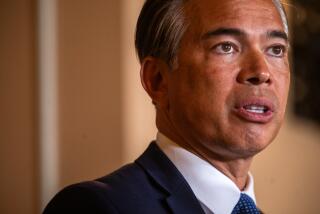Lawyers Given 30 Days to Settle King Civil Suit; Trial Set for ’94
- Share via
With lawyers on both sides of Rodney G. King’s lawsuit against the city of Los Angeles expressing optimism that a settlement might be in the offing, a federal judge Monday gave the parties 30 days to strike a deal but set a trial date for early next year in case the talks prove fruitless.
If no settlement is reached, the trial is scheduled to begin March 22. That would make it the third high-profile trial in three years to grow out of the March 3, 1991, police beating of King.
“I think we’ve got to get the case on track and move forward toward trial,” U.S. District Judge John G. Davies said. “This case should go to trial early next year, in my view.”
Monday’s hearing was the first since Davies sentenced Sgt. Stacey C. Koon and Officer Laurence M. Powell to 2 1/2 years in prison each as a result of their violation of King’s civil rights.
By coincidence, Davies also is presiding over King’s lawsuit. Although some observers criticized the judge’s findings in imposing sentences on the two officers, none of the 17 lawyers present for Monday’s hearing requested that Davies give up responsibility for the civil case.
Although King’s lawsuit involves many of the same facts as the recently concluded federal civil rights trial of the officers, it is expected to probe more deeply into the policies and practices of the Los Angeles Police Department, a turn of events that could produce some new and unusual alliances.
For instance, lawyers for the officers argued during the federal trial that their clients should not be found guilty in part because they were following their training when they beat King. That defense failed to convince jurors in that case, but the same evidence could help King in the civil trial. King’s lawyer, Milton Grimes, is expected to argue that the city is liable for King’s injuries in part because the LAPD training was flawed.
While Davies set dates for the trial and for a number of pretrial hearings, he also agreed to another short delay in the discovery process after lawyers said that settlement talks were under way. The discovery process was put on hold while the federal criminal trial was under way; Davies had said he would lift it Monday.
But Grimes and Donald Vincent, the deputy city attorney who represents Los Angeles in the case, each told Davies that they were engaged in another round of settlement talks. Vincent asked the judge for a 30-day extension of the hold while talks proceeded.
Although neither lawyer would publicly comment on what was being discussed, the city’s last public offer to King proposed a cash payment of $250,000 and establishment of a $1-million fund to be doled out to him over his lifetime. Vincent said outside court that the offer, which was rejected by King, is still open.
Grimes and representatives of the city attorney’s office met with two judges and a retired California Supreme Court justice in March to discuss a settlement, Vincent added. They talked for a day but reached no agreement, he added. Since then, Vincent said, the city attorney’s office has continued to talk with Grimes.
In court, Grimes confirmed that there had been recent talks and asked Davies to allow him and Vincent to brief the judge privately on the status of negotiations.
“I think it will affect our discussions here,” said Grimes, who described himself as optimistic that a settlement can be reached. “I say that in good faith.”
But King and the city are only two parties in a set of interlocking lawsuits and counterclaims that involve 19 LAPD officers, seven California Highway Patrol officers, two helicopter pilots, three city officials and a number of agencies. Moreover, King is only one of three plaintiffs: There were two passengers in his car on the night of the incident, and both said they were struck as well.
One, Freddie Helms, has since died during an unrelated auto accident, but his family has kept up the lawsuit.
With so many participants and conflicting interests, lawyers for some of the other parties objected to being excluded from any talk between Grimes, Vincent and the judge. After considering the request, Davies declined to hold the private session. He did encourage Grimes and the city to negotiate a settlement.
“I wish you all the luck in the world,” Davies said to Grimes. “Go get the best price you can.”
If after 30 days the two sides remain unable to reach agreement, discovery would resume under tight controls by Davies. The judge reminded lawyers that two trials have produced an abundance of evidence, and he limited their rights to gather depositions from potential witnesses.
Under the rules set by Davies, no witness--including the four officers charged in the criminal trials and King--could be questioned by lawyers for more than one day.
All discovery would have to be finished by late January, and the trial would then begin in March. Lawyers predicted that the trial could take up to 12 weeks.
More to Read
Sign up for Essential California
The most important California stories and recommendations in your inbox every morning.
You may occasionally receive promotional content from the Los Angeles Times.














